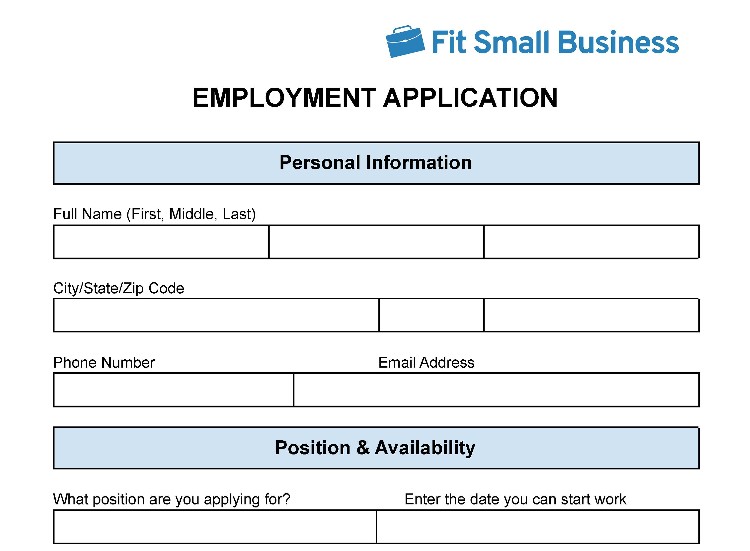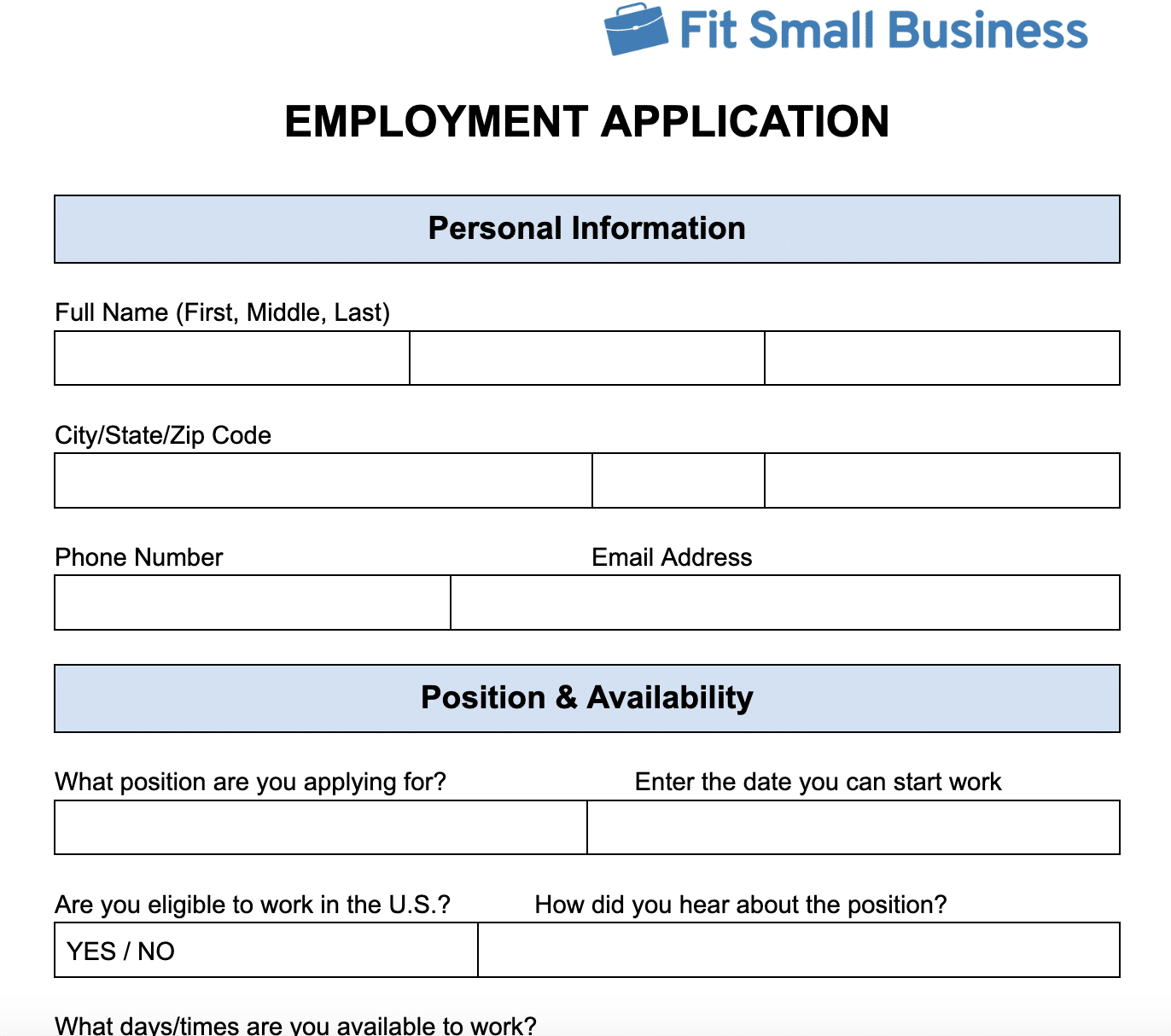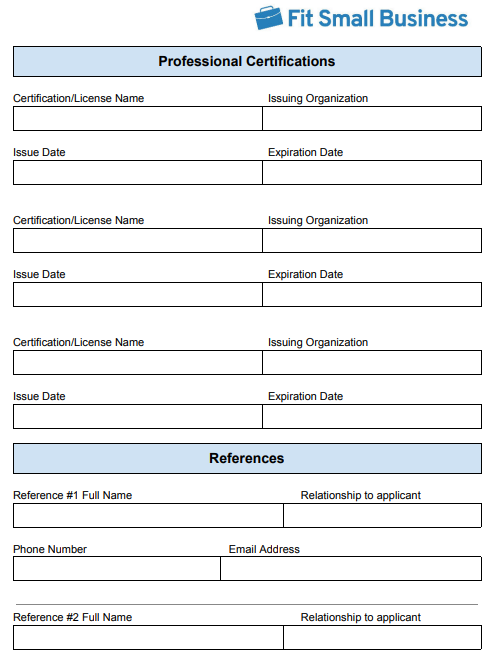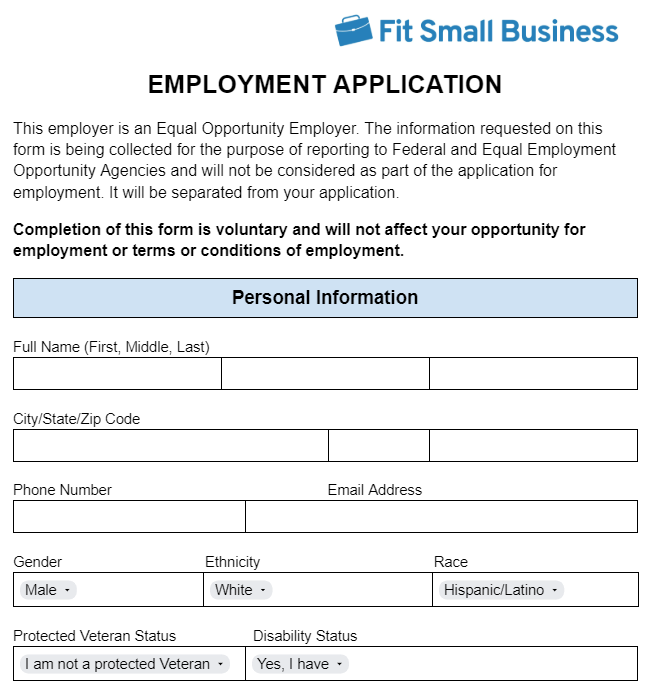Employment application forms are essential for any business looking to hire new employees. These generally contain sections for personal and demographic data, as well as work history and qualifications, to help you make the best decision when reviewing candidates.
Below are some guidelines on how to create an employment application form. You can also download, customize, and use my ready-to-use standard employment application template—I even added some special-case use templates in the Types of Employment Application Forms section.

Thank you for downloading!
If you need an easy way to advertise your open jobs, consider ZipRecruiter. Applicants can submit their resumes on multiple platforms—ZipRecruiter posts your position on more than 100 job sites, and it offers daily payment options for users who plan to hire quickly. Sign up to start posting jobs for free.
What to Include on a Job Application Form
A job application form will generally include information in six key areas: personal information, position and availability, education, employment history, skills and training, and references.
Personal Information
There is basic information you will need from every job applicant. This is not only important for contacting the applicant for follow-up questions, interviews, or job offers, but it also allows you to get a head start on entering their information into your human resource database. You can then use it when starting on state-specific items, like tax registration.
Personal information will include the following:
- Full name
- Address
- Phone number
- Email address
Position & Availability
For tracking purposes, you will want to know what specific job an employee is applying for, which is important for companies that have multiple job postings at the same time. For strategic planning purposes, you must also know when an applicant can start working.
Other information related to position and availability may include the following:
- US work eligibility
- Work availability (days/times), key for flexible or shift-based positions
- Where the applicant saw the job posting
Education
Most jobs require a certain amount of education for candidates to be successful. This information is also useful in considering job applicants for other positions and future promotions for applicants who were hired.
Educational information includes the following:
- Name and address of the school
- Graduation status
- Degree earned
- Grade point average (GPA) (optional)
Employment History
Like education, the employment history section gives you more information about what past experiences have prepared the applicant for the available position. The company and job title information, specifically, give you insight into how relatable your open position is to the applicant’s previous jobs, and the responsibilities section gives you a chance to see what transferable skills the applicant has exhibited in prior positions.
Employment history-related information includes the following:
- Company name, address, and phone number
- Supervisor name
- Job title and responsibilities
- Dates of employment
- Reason for leaving, if voluntary (optional)
- Permission to contact previous employer
Skills & Training
Including a section for skills and qualifications in an employee application form serves several important purposes in the hiring process. Skills and qualifications can serve as quick indicators of an applicant’s suitability for a position. Hiring managers can easily compare an applicant’s qualifications with the job requirements and qualifications to determine if there is a match.
Different positions may require different skills and qualifications. Including this section allows you to tailor the application form to each specific job, ensuring that you gather relevant information for each role.
In some industries or for certain positions, there may be regulatory or legal requirements to verify an applicant’s qualifications or certifications. Including this section helps ensure compliance with such requirements.
Include the following information:
- Skills relevant to the position
- Relevant certifications and training and when these were acquired
References
Before you hire a new employee, it is a good idea to collect references. While not required, references can help you get a better picture of the person from the view of a third party. This person can be a direct supervisor, colleague, mentor, or friend. These individuals can help you determine whether the applicant will fit into your company’s culture and perhaps give you insight into the best environment for the applicant to thrive. You can use these reference check questions to verify information that a candidate has given.
Information on references includes the following:
- Full name
- Relationship to applicant
- Company name
- Phone number and email address
What to Avoid on an Employment Application Form
While you need as much information as possible on an employment application to best understand the candidate, there are certain things you will want to avoid asking for. See our table below for data to avoid and why.
Data to Avoid | Reason |
|---|---|
Marital Status, Salutations | Title VII, Sexism and Gender Discrimination |
Title VII, Financial Status and Race | |
Social Security Number or Tax Status | Privacy and Data Security |
Title VII and ADEA | |
Military Dates or Discharge Reasons | Title VII, HIPAA, and ADEA |
Date of Birth | Title VII and ADEA |
Graduation Dates | Title VII and ADEA |
Citizenship and Visa Status | Title VII and Ethnicity |
Reasons for Termination From a Prior Job, Arrest Record | Title VII, HIPAA, Wage Discrimination, and Legal Issues Like Libel |
Reasons for Termination From an Arrest Record | Title VII, HIPAA, Wage Discrimination, and Legal Issues Like Libel |
Reasons for Termination From a Prior Salary | Title VII, HIPAA, Wage Discrimination, and Legal Issues Like Libel |
Requesting information like that in the table above can put your company at risk. It may be a violation of federal labor laws, antidiscrimination laws (like the Title VII of the Civil Rights Act of 1964), age discrimination laws (like the Age Discrimination in Employment Act of 1967 (ADEA)), or Health Insurance Portability and Accountability Act of 1996 (HIPAA) laws, which protect a person’s confidential health-related information.
Types of Employment Application Forms
Below are different types of employment application forms for your specific hiring needs. You can also download and customize the template
Standard Paper Application
These are traditional employment application forms that remain relevant despite the digital transformation. As a hiring professional, I recommend keeping paper applications available because of the following:
- They accommodate candidates who may have limited data access.
- They work well for in-person job fairs and walk-in applications.
- They provide a backup when the digital systems fail.
Digital/Online Application
You can place a job application template on your website, job boards, or applicant tracking systems (ATS). Each of these digital formats has its advantages.
Company website portals serve as direct channels for candidate applications, offering seamless integration with HR systems while maintaining consistent branding throughout the application experience. Job board applications, on the other hand, have a wider reach and contain features like resume parsing and skill matching. Meanwhile, ATS forms have automated initial screening and compliance checks.
Short-Form Application
These serve as efficient initial screening tools, particularly in high-volume positions or preliminary candidate evaluations. Short-form applications focus on capturing essential information without overwhelming candidates with lengthy forms or excessive detail requirements.
Comprehensive Application
These detailed forms are specifically designed for professional and regulated positions, requiring extensive candidate information for thorough evaluation. They collect the following:
- Detailed work history with specific dates
- Complete educational background
- Professional certifications
- Reference checks
- Background authorization
Industry-Specific Application
These specialized application forms address unique requirements across different sectors while ensuring regulatory compliance. For example, education sector applications prioritize teaching credentials and child safety checks. Meanwhile, financial services applications concentrate on securities licenses and regulatory certifications.
Equal Employment Opportunity Application
These essential supplementary forms support workplace diversity and legal compliance while collecting voluntary demographic information. They typically include sections for demographic data, disability disclosure, and veteran status, all maintained separately from the main application.
Resume vs Application Form: When to Use Either or Both
Resumes and employment application forms serve different purposes and are needed in different situations during the hiring process. When to use each document or when to request both depends on your specific needs and preferences as an employer:
Requesting both a resume and an employment application form can be a reasonable practice in many situations, as it allows employers to collect comprehensive information and maintain compliance. However, when considering the candidate experience, employers should ensure that applicants understand why both documents are requested and how they contribute to the evaluation process.
Employment Application Form Frequently Asked Questions (FAQs)
Create standardized evaluation forms and train reviewers on assessment criteria. Use knockout questions for essential requirements and maintain documented decisions with clear reasoning. Schedule regular review sessions to ensure consistency. Here are a couple of examples:
- How do you prioritize your tasks when faced with multiple deadlines?
- Describe a recent situation where you had to manage competing priorities.
- What strategies do you use to stay organized?



